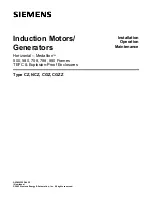
- 5 -
Installation
Motor Dimensions
For motors built in the frame sizes covered by this
manual, the letter dimensions have the same
definitions as established NEMA standards.
Established dimensions for these frames may be found
on catalog sheets or certified drawings.
CAUTION
Damp Location.
Can cause property damage if equipment is operated
intermittently.
Use space heaters to prevent dampness. Grease
machine fits when unit is reassembled to prevent
corrosion.
Location
Select a location for the motor and driven unit that will:
1. Be clean, dry, well ventilated, properly drained, and
provide accessibility for inspection, lubrication and
maintenance.
2. Provide adequate space for motor removal without
shifting the driven unit.
3. Permit the motor to safely deliver adequate power.
Temperature rise of a standard motor is based on
operation at an altitude not higher than 3,300 feet
above sea level.
4. Avoid condensation of moisture in bearings and on
windings. Motors should not be stored or operated
in areas subject to rapid temperature changes
unless motors are energized or protected with
space heaters.
Foundation
Concrete (reinforced as required) makes the best
foundation, particularly for large motors and driven
units. In sufficient mass it provides rigid support that
minimizes deflection and vibration. It may be located
on soil, structural steel, or building floors provided the
total weight (motor, driven unit, foundation) does not
exceed the allowable bearing load of the support.
Allowable bearing loads of structural steel and floors
can be obtained from engineering handbooks. Building
codes of local communities give the recommended
allowable bearing loads for different types of soil. For
rough calculation the foundation should be
approximately 2-1/2 times total unit weight.
Before pouring, locate foundation bolts by use of
template frame and provide secure anchorage (not
rigid). It is recommended that a fabricated steel base
be used between motor feet and foundation. See
certified drawings of motor, base, and driven unit for
exact location of foundation bolts. Allow for grouting
base when pouring. Cast the base footpads level and
in the same plane.
Mounting
Mount the motor base (if used) on foundation or other
support. Shim as required to level. Use laser or spirit
level (check two directions at 90
o
) to insure motor feet
will be in one plane (base not warped) when base
bolts are tightened. Set motor on the base, install nuts
and tighten.
DO NOT TIGHTEN UNTIL AFTER ALIGNMENT.
NOTE
Experience has shown that any base-mounted
assemblies of motor and driven units temporarily aligned
at the factory may twist during shipment. Therefore,
alignment must be checked after mounting.
Realignment is to be documented for warranty
information
.
Coupling of Sleeve Bearing Motors
Sleeve bearings cannot withstand externally generated
axial thrust. Antifriction bearings are normally
designed to handle a minimum thrust. As the motor
and driven equipment get hot they may expand
towards each other and with the wrong coupling this
could produce an axial force. Therefore, the selection
of coupling is of extreme importance. If properly
installed, the following types of couplings are
considered to be free from the development of axial
thrust and may be used:
1. Laminated Metal Disk Type
2. Rubber Biscuit Type (Designed for the Speed)
Limited end float models of the following types are
available from several coupling manufacturers and
may be used by selecting the proper end float (See
“End Float – Sleeve Bearings” under
Bearing
Replacement
)
3. Pin and Bushing Type
4. Gear
Type







































